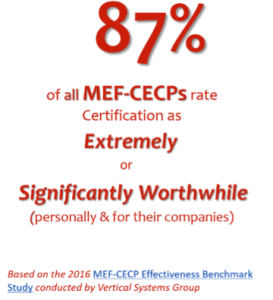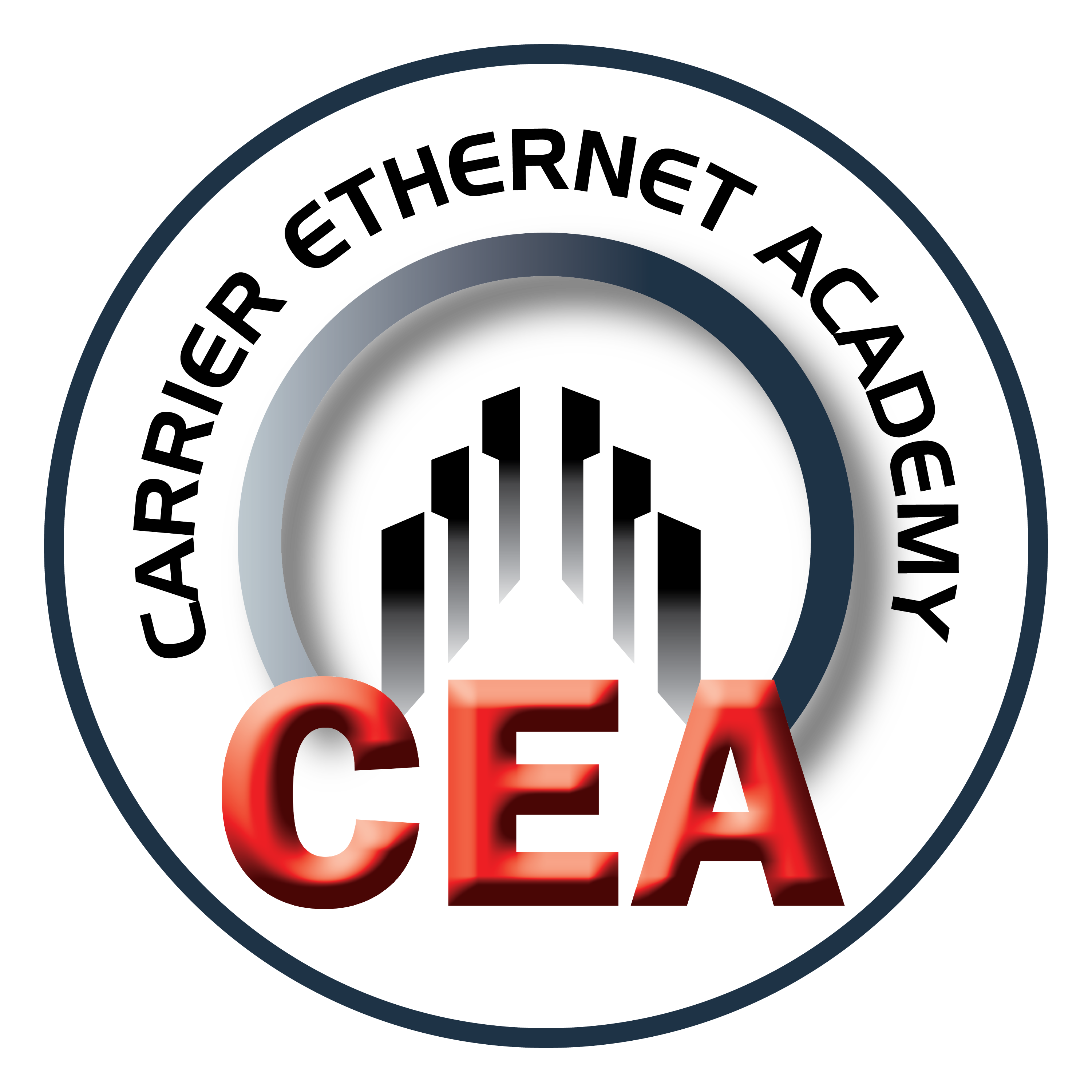
The Carrier Ethernet Academy’s MEF-CECP Boot Camp is a comprehensive, vendor-neutral training course that covers Carrier Ethernet and the MEF technical specifications. The course provides professionals from telecom service provider or equipment vendor companies with the most advanced education in the field of Carrier Ethernet available anywhere!
The MEF-CECP Boot Camp course has been updated to cover all MEF CE 3.0 topics added to the MEF-CECP exam Blueprint “D”. This includes coverage of the new OVC service definitions from MEF 51, coverage of Service Activation Testing (SAT) from MEF 48 and expanded coverage of Phase 2 of the Service OAM Fault and Performance Management specifications from MEF 30.1 and 35.1.
The Carrier Ethernet Academy continuously updates and enhances its courseware to cover the current MEF-CECP Blueprint. In addition, all of our instructors are active participants in the MEF technical work, and are capable of providing explanation and information on on-going work at MEF like the forthcoming Managed Access E-Line services specifications.
The Carrier Ethernet Academy’s accelerated  course will take you from novice to Carrier Ethernet expert in 3 fast-paced days. The Boot Camp presents Carrier Ethernet from an application-oriented perspective, teaching you how to understand and apply Carrier Ethernet concepts and related technologies to:
course will take you from novice to Carrier Ethernet expert in 3 fast-paced days. The Boot Camp presents Carrier Ethernet from an application-oriented perspective, teaching you how to understand and apply Carrier Ethernet concepts and related technologies to:
- More effectively communicate and position your company’s products and services
- Better understand your customers’ specific applications and use cases
- Accurately specify solutions for the right Carrier Ethernet services to meet a variety of requirements
At the end of the course you’ll have an expert level understanding of Carrier Ethernet concepts, MEF-defined services and interfaces and a solid basis for how these services are delivered using common Carrier Ethernet data networking technologies and protocols. You’ll also be able to use the knowledge you gained in our Boot Camp your very first day back on the job.
It goes without saying that you’ll also be fully prepared to successfully pass the MEF-CECP exam, and obtain your certification immediately following the training—without any additional studying prior to or following the course. Our graduates are not only ready to take the exam after the 3-day course, the overwhelming majority are MEF-CECP certified on their first attempt.
The Carrier Ethernet Boot Camp is available onsite, or at a publicly scheduled training session. Please refer to Register page for public session dates and locations. For an onsite session, please contact us.
Curious about the MEF-CECP exam? Click on any category to see a sample question!
The success of the MEF can be directly attributed to the creation of the Carrier Ethernet service definitions that detail the functionality for the Ethernet equivalents of legacy private line, virtual private line and transparent LAN services. The service definitions, attributes and parameters are detailed in the MEF 6.1 and 10.2 Technical Specifications. A great deal of emphasis is placed upon this topic as the MEF-CECP is expected to understand the services both in terms of rote comprehension of the details of each service definition, as well as how they are applied to various application scenarios.
Sample question:
A company wants to extend Ethernet connectivity between their 5 factories to its two financial processing centers. The two financial centers each have a single UNI with an EPL between them for data mirroring (disaster recovery). The branches can’t be allowed to see each other’s sensitive financial data. Which service meets the company’s requirement?
Possible answers would include:
Possible answers would include a list of various service definitions (e.g. EPL, EVPL, EPLAN, EVPLAN, EPTree and EVPTree) covered in MEF 6.1.
The MEF services are “transport agnostic” meaning that they can be transported over a variety of communication methods ranging from Packet Optical Transport, over legacy SONET or TDM transmission system or even Carrier Pigeons! But in reality, the transport technology must be able to support the characteristics of the service being carrier over it. The MEF-CECP must understand the capabilities of a number of transport protocols in order to select that appropriate means for successfully delivering a specific Carrier Ethernet service.
Sample question:
Which transport protocols support multipoint services?
Possible answers would include:
A list of transport protocols.
Providing access to the Metro Ethernet Network from a subscriber location requires navigating a number of choices with respect to the network infrastructure and media (e.g. copper, fiber, coax, etc.) in the access network, and selecting an appropriate access technology is important to the CECP’s understanding of the technical details of delivering a Carrier Ethernet service. This section requires the MEF-CECP to demonstrate knowledge of commonly used access technologies and understand their ability to select the best one given a particular application scenario.
Sample question:
In order to reach a remote cell site located 5 miles away from its nearest fiber access point, Fiber Tree Networks deploy which of the following access technologies?
Possible answers would include:
A list of access technologies like those covered in the MEF Access Technology White Paper.
This topic requires the Carrier Ethernet expert to understand and identify the correct technical definition for commonly used MEF terms, like UNI, EVC, OVC, ENNI along with the roles of various components of Carrier Ethernet.
Sample question:
An Ethernet Virtual Private Line utilizes which of the following Ethernet Virtual Connections?
Possible answers would include:
The precise definition, along with several others that although close, aren’t the precise definition from the MEF documents.
A MEF-CECP must demonstrate mastery of the hundreds of attributes and attribute parameters that can be configured in the definition of a MEF service. This section requires detailed understand of the myriad of tables listed in the MEF 6.1, 10.2 and 26 Technical Specification documents. This is one of the core aspects of the exam and candidates can expect thorough coverage.
Sample question:
The CE-VLAN ID to EVC map may have how many entries for an EVPL service?
Possible answers would include:
The correct number, along with others that are less correct (ie wrong!).
The MEF-CECP is expected to have knowledge of the MEF’s Equipment Vendor and Service Provider certification programs, including the certifications that exist within the two categories, how the certification testing is performed and the criteria for participating.
Sample question:
In order to participate in the MEF equipment certification program, which of the following must be met?
Possible answers would include:
A list of the correct criteria for participation in the MEF Certification Program along with a few other choices that aren’t required.
This is the most extensively covered topic on the MEF-CECP exam. A MEF-CECP is expected to have comprehensive practical application expertise. A MEF-CECP is required to understand the service connectivity requirements, the specific service attributes that need to be applied, select the correct bandwidth profile configurations and other details to successfully navigate this most challenging section of the examination.
Sample question:
A distributed enterprise needs to connect its branch offices to the HQ location which acts as the Hub. The branch office gateways don’t support VLANs. Which service best meets the requirement?
Possible answers would include:
A list of service types (EPL, EVPL, EP-Tree, EVP-Tree, etc.) several of which could be used, and the candidate needs to select the BEST one. Good enough, usually isn’t!
This section builds on the application section discussed earlier but requires the MEF-CECP to successfully compare, contrast and differentiate MEF standard services from other common Layer 2 (e.g. frame relay and ATM) and Layer 3 (e.g. IP VPN) based services. This is the area of the exam that examinees typically score the poorest on.
Sample question:
Which of the following is similar to a frame relay best effort Internet access and branch office service?
Possible answers would include:
A list of Ethernet services that could be compared with the frame relay service, and the candidate is asked to select the best one from the list. (Sounds easy, huh!)
Circuit emulation services, where legacy TDM service is delivered over an MEF standard service is also an important area for the MEF-CECP to understand. CESoETH as it’s called in the vernacular has significant applicability in a variety of different use cases ranging from connecting legacy enterprise telephony equipment, to the migration of mobile backhaul services from TDM to Ethernet. The MEF-CECP will be tested thoroughly on mastery of the concepts covered in the MEF 3 and MEF 8 documents.
Sample question:
Which connectivity is valid for Circuit Emulation Services over Ethernet according to MEF 8?
Possible answers would include:
The one that is specified in MEF 8 and a few others that aren’t. Happy hunting!
Operations, Administration and Maintenance capabilities for Ethernet have come along way…from non-existent to fairly comprehensive in the past few years and continues to be a primary focus of the MEF. A MEF-CECP will be expected to understand how Service OAM Fault and Performance management tools like those defined by IEEE 802.1ag and ITU-T Y.1731 function and are used to provide performance and fault management for Carrier Ethernet networks.
Sample question:
Traffic that is subject to the SLS includes which of the following?
Possible answers would include:
Traffic types that are subject to the service level specifications set forth in a service level agreement (SLA) and some that aren’t. Heck, just understanding the difference between these two should be a question…and maybe it is!
